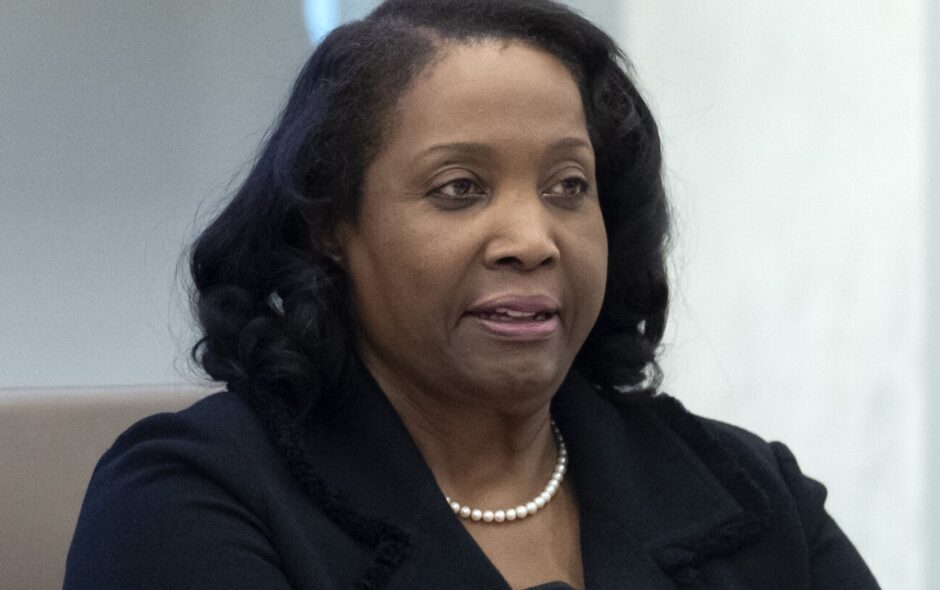The first Black woman on the Federal Reserve Board refuses to resign, setting up a legal showdown that could reshape presidential power and central bank independence.
Washington, D.C. — In a dramatic confrontation that could redefine the independence of America’s central bank, Federal Reserve Governor Lisa Cook said Tuesday she will sue President Donald Trump after he attempted to fire her from the board. The showdown, rooted in unproven allegations of mortgage fraud, threatens to plunge one of the nation’s most trusted institutions into a political and constitutional storm with global repercussions.
Cook, appointed by President Biden and confirmed in 2022, is the first Black woman ever to serve on the Federal Reserve Board of Governors. Her term extends through 2038. Trump announced on social media that he was removing her “for cause,” citing claims that she misrepresented her housing arrangements on loan applications before joining the Fed. Within hours, Cook rejected the order, stating bluntly that the president has “no authority” to remove her and pledging to take the matter to court.
At stake is not only Cook’s seat but the very principle of Federal Reserve independence. Under the Federal Reserve Act, governors serve fixed terms and can be removed only “for cause,” a phrase long interpreted to mean misconduct during their service. Cook’s attorney, Abbe Lowell, said the allegations are both false and irrelevant to her work at the Fed. The board itself released a statement emphasizing that governors are meant to be shielded from political pressure in order to preserve the credibility of monetary policy.
Trump’s move comes as he works quickly to consolidate influence over the central bank, filling vacancies with loyalists and pressing for lower interest rates. If he succeeds in ousting Cook, he could tilt the board in his favor, undermining the tradition of data-driven decision-making that has guided the Fed for more than a century. Economists warn that such politicization could weaken confidence in the dollar, spark market volatility, and destabilize the global financial system.
Financial markets reacted instantly to the clash. Futures fell sharply after Trump’s announcement, signaling fears of direct political interference in monetary policy. Treasury yields ticked upward, reflecting worries that pressure for lower rates could stoke inflation. When Cook vowed to resist, markets regained some ground, though analysts said volatility would persist until the legal questions are resolved. International officials expressed alarm, with European Central Bank President Christine Lagarde cautioning that undermining Fed independence could have global consequences.
The legal fight now turns on whether the president can use alleged misconduct from before a governor’s service as grounds for removal. Courts have never squarely addressed the issue, and legal scholars expect the case to reach the Supreme Court. A ruling in Trump’s favor would expand executive power and give future presidents a freer hand to shape independent agencies. A victory for Cook would reaffirm long-standing protections designed to insulate central bank officials from partisan politics.
Cook’s career underscores the stakes of the confrontation. A veteran economist trained at the University of California, Berkeley, she spent much of her career at Michigan State University, producing influential research on innovation, economic growth, and inequality. Before joining the Fed, she served on the board of the Federal Reserve Bank of Chicago. Her appointment in 2022 was hailed as a historic milestone, bringing long-overdue diversity to the upper ranks of U.S. economic policymaking.
Now, that legacy is bound up in a lawsuit that will test the strength of the institutions she serves. Cook insists the case is about more than her personal role: it is about whether the Federal Reserve can remain independent of the White House. “He has no authority to remove me,” she said, framing her fight as a defense of the rule of law.
The outcome will echo far beyond Washington. If Cook prevails, it will signal that the courts are willing to protect the independence of the Federal Reserve even against presidential pressure. If Trump wins, the decision could clear the way for the central bank to be reshaped into a more overtly political instrument, altering how the United States manages interest rates, inflation, and economic crises.
For now, Cook remains in office, preparing for a battle that could last months or even years. Her refusal to resign has turned what might have been a behind-the-scenes power struggle into a defining test of presidential authority and central bank autonomy. The world is watching closely, aware that the stability of the global economy may rest on the fate of one governor and her willingness to challenge a president in court.




